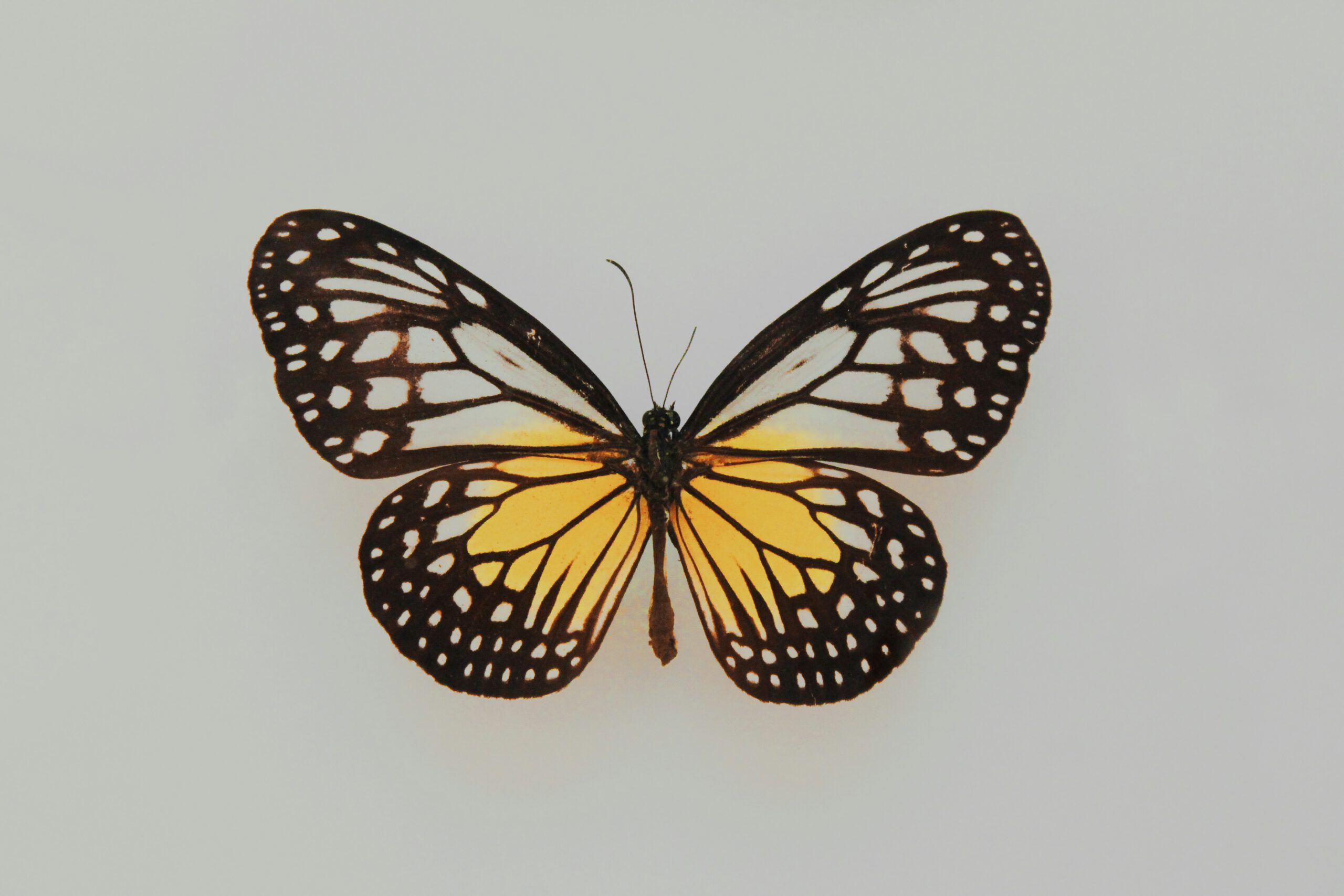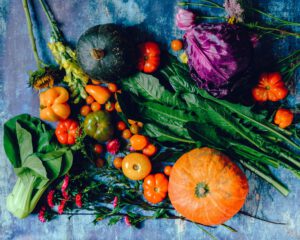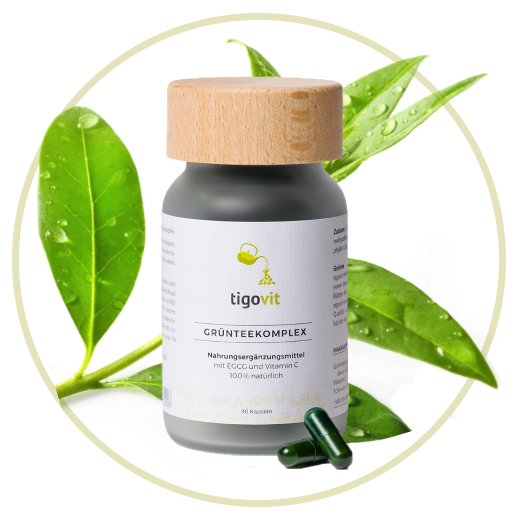
Interview with Vanessa Blumhagen
She is the founder of Hashimoto Deutschland, an author and is herself affected by Hashimoto's. In an interview with Tigogreen Managing Director Tanja Hohenester, Vanessa Blumhagen provides valuable insights and tips on coping with the autoimmune disease Hashimoto's, in which the thyroid tissue is attacked by the body's own immune system. Vanessa shares her expertise and personal experiences, which she has recorded in her books on Hashimoto's thyroiditis. This article provides an overview of symptoms, treatment options and proven strategies for successful management of Hashimoto's, straight from an expert and sufferer.
How did Hashimoto Germany come about?

Great tasks are often preceded by great coincidences. For example, after three (!) years of searching for a diagnosis, Vanessa first found the diagnosis of Hashimoto's by chance, not by a doctor. Of course, the diagnosis of Hashimoto's was subsequently confirmed by a doctor.
"Despite taking the classically prescribed tablet once in the morning, I didn't notice any change. I didn't lose any weight, my hair kept falling out, I was still exhausted, I was going through the menopause in my late 20s, I had a lot of allergies and my arms and legs were falling asleep."
America 2010: The topic of hormones, women's health and Hashimoto's was already omnipresent, so Vanessa stocked up on books and made appointments with hormone experts. This was not possible here in Germany at the time, experts were hard to find.
"I have put all my Hashimoto's knowledge into practice"
I implemented everything I learnt from these books and from the American hormone experts. And lo and behold:
"My hair grew back, the pounds dropped off, I had no more allergies, my period started again and came regularly - it was life-changing."
Somehow these successes reached a Munich publisher who asked: "Wouldn't you like to write a book about it?" It was a complete success and the invitations to appear on TV programmes were accompanied by Facebook posts that received more messages and comments on some channels than ever before. In other words, the topic was hot and demand was extremely high. This is how Hashimoto Germany was born.
Workshops for Hashimoto's sufferers
There are regular online lectures on various topics for Hashimoto's sufferers. Vanessa is particularly keen to do this: "My presentations are always live, nothing canned." In this way, Hashimoto's sufferers can ask questions and are told everything they need to know live. The topic is particularly important "Optimising thyroid hormone levels"which, according to Vanessa, is the most decisive factor in Hashimoto's.
Knowledge exchange at the annual Hashimoto Day
Every year there is also the "Hashimoto Day", a congress for sufferers with great invited speakers and suitable exhibitors - we from Tigogreen were able to be there in Hamburg in 2023. Vanessa emphasises passionately:
"Hashimoto's Day is incredibly powerful, especially because it's a brilliant opportunity to meet 200 other Hashimoto's sufferers. No expert or doctor can help as well as direct dialogue. I am calling on everyone personally: Network, exchange numbers, form WhatsApp groups, meet up and support each other!"
Vanessa Blumhagen's Hashimoto's book: "Every day I got fatter and more tired"
In her first book, the author talks about a holistic health concept and how she integrates it into Hashimoto's. The consensus is that almost all diseases today, whether autoimmune diseases or endometriosis, for example, have one thing in common: the cause lies in lifestyle.
"You have to imagine that our genetics are such that we still sit at altitude, occasionally defeat sabre-toothed tigers, get food and then return to the community. There's no stress, no pesticides, no artificial light."
However, these are the factors that fuel or cause modern diseases.
"The aim is to bring as much as possible of this stress-free primal life back into our modern lives in order to eliminate the causes of these diseases"says Vanessa Blumhagen.
No. 1 - Avoid toxins
To get back to this primal life without moving into a cave, it is particularly important to avoid toxins wherever possible. This includes
- Buy organic food
- Wash fresh fruit and vegetables well before eating
- Installing the water filter
- Use natural cosmetics such as Tigoderm (Vanessa: "It takes 30 minutes for what we apply to the skin to end up in the blood!")
- Avoid synthetic clothing or wash new clothing 3 times before wearing it for the first time ("The colour also passes through the skin barrier")
- Natural instead of synthetic hair colours
- Omit artificial eyelashes and fingernails
If it is scary to change or give up all this, the motto is: "Change little by little and establish the new habits in your own life." There is still too little measurement and research into what all the substances such as PFAs that are in circulation on earth do to our tissue when they come into contact with it.
The basis for Hashimoto's: the right diet
The following foods should be removed from the diet:
- Gluten
- Conventionally produced dairy products
- Soya
- Caffeine
- Sugar

Avoiding gluten - getting out of the Hashimoto's flare-up
Gluten is at the top of the list of substances to avoid with Hashimoto's.
On the one hand, gluten causes a perforated intestinal mucosa, so that pathogens can penetrate the intestine more easily. This favours allergies, intolerances or autoimmune diseases. Secondly, for the misdirected immune system in Hashimoto's, the gluten molecules look exactly like the antibodies of the thyroid gland. When gluten circulates in the body, the misdirected immune system attacks the cells of the thyroid gland, destroys the tissue and the thyroid gland can no longer produce thyroid hormones. This is ultimately the clinical picture of Hashimoto's disease.
"It is important to get out of this rut. Measure no. 1 is therefore to completely and permanently eliminate gluten from the diet. Every bread roll and every cake sets a Hashimoto's sufferer back three to six months, which is how long it takes the body to eliminate gluten from the system. I haven't had a single flare-up in ten years."
Vanessa adds:
"I have also observed great changes in people affected by giving up gluten: skin problems disappear, weight loss of 10kg, brain fog disappears and allergies also disappear."
Dairy products
In particular, conventionally produced, pasteurised dairy products without valuable nutrients should be eliminated. They promote weight gain, inflammation and intestinal imbalance.
Soya
On the one hand, soya is often genetically modified and on the other, soya prevents the incorporation of iodine into T4, one of the thyroid hormones. It consists of the amino acid tyrosine and four molecules of iodine. Soya blocks the receptors on the thyroid gland to which iodine actually wants to dock. "By eating soya, we are building our own hypothyroidism".
Caffeine
Caffeine damages the adrenal gland, which is usually already damaged in autoimmune diseases such as Hashimoto's disease. The adrenal gland and thyroid gland balance each other out.
Fortunately, there is now a wide range of gluten-free flours and products available in organic and supermarkets. Buckwheat is currently at the forefront of gluten-free bread and cake baking - be sure to try it out!
How much iodine for Hashimoto's?
In general, it is particularly important to take supplements for Hashimoto's, as food nowadays tends to be low in nutrients and the nutrient consumption of those affected is also significantly increased. It is best to have a doctor test which nutrients are actually present and in what quantities. Have iodine in the blood and iodine in the urine checked to see what is missing.
Until a few years ago, the saying was "stay away from iodine with Hashimoto's". This is only half the truth. If the TPO and TG antibodies are elevated, this rule applies: never take iodine. This is because there is already inflammation in the thyroid gland. Adding iodine on top of that means pouring oil on the fire.
The first step here is to ensure that the antibody concentration falls. If these are reduced again and iodine deficiency is detected in the urine at the same time, it is important to supplement iodine. Not with iodised salt, as iodine is very volatile and therefore hardly any iodine is left.

Kelp as best source of iodine
The best source of iodine is the kelp algae. The only important thing here is to pay attention to the origin and the laboratory certificate. With good food supplement manufacturers, the certificate with laboratory values should be available to ensure that the algae are not contaminated with heavy metals.are burdened. The intake of iodine should be increased slowly, up to about 150µg daily. More would be excessive.
Iodine is important for two reasons
Firstly, the thyroid gland needs iodine to function, as the trace element is a key component of thyroid hormones. There is also another important point. Our breasts have iodine receptors that also need to be filled with iodine. This also reduces the risk of developing breast cancer. There are very many women and, incidentally, also men who develop breast cancer - in Germany around 2000 men are diagnosed with breast cancer every year.
Hashimoto's: reduce inflammation and have fun
Hashimoto's is also an inflammation of the thyroid gland. It is therefore important to ensure that inflammatory processes in the body are inhibited. To do this, Vanessa pays attention to all the points mentioned above in terms of diet and generally avoiding toxins. "I eat a lot of vegetables, have topped up all the micronutrients that were deficient, take anti-inflammatory plant substances, omega 3 and zinc, for example. I avoid sugar wherever possible and above all I make sure I have fun in life."
It is also important to avoid electrosmog. This means, for example, unplugging the router in the evening. And as I said:
"Integrating lots of fun into life is the best anti-inflammatory. Laugh a lot, surround yourself with good people and enjoy life."
Yoga and exercise - but not too intense
"Lots of yoga, lots of exercise, but not too intense to protect the adrenal glands," is Vanessa's recommendation. "Our walk to the fridge is short, which means we don't have to move around to get food like we used to."
However, it is important to avoid strenuous sports such as HIIT, as this puts extreme stress on the adrenal glands. Cortisol rises and the hormone systems have difficulty finding their balance. Gentle exercise is therefore important.
Other exciting options such as acupuncture and the treatment of interference fields in the body using neural field therapy can also help to restore balance in the body.
Final message from Vanessa Blumhagen
"Stand up for yourselves, dear women!" With a chronic illness such as Hashimoto's, it is particularly important to take responsibility for your own health.
"You have to be prepared to acquire knowledge and deal with your own body. It's your life, it's your body and you can find out - with the help of doctors and experts, of course - what you need to lead a healthy life."
The full interview by Tanja Hohenester and Vanessa Blumhagen:
Interview "Hashimoto in focus" on YouTube
Find out more about Hashimoto's thyroiditis and Hashimoto Germany:
Hashimoto Germany:
https://www.hashimoto-deutschland.de/
Instagram: @hashimoto_germany
Facebook: Hashimoto Germany
Tiktok: @hashimoto_germany
Books about Hashimoto's thyroiditis:
- Vanessa Blumhagen, Every day I got fatter and more tired. My life with Hashimoto's.
- Vanessa Blumhagen and Anna Funck, Healthy, strong, beautiful: This is how women's health works today. No more weight problems, indigestion, puffy eyes & co. Holistic health knowledge.




Bonjour le livre est il en allemand ?
Oui, c'est en allemand.